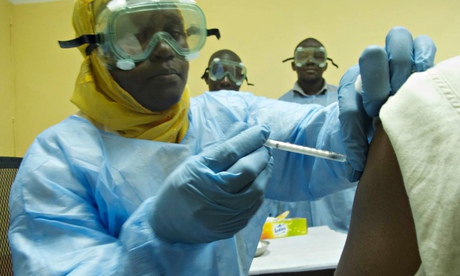
Experimental drugs for Ebola must not be trialled in west Africa in the normal way because it would be unethical to deny them to some of the patients at high risk of death, say scientists.
Drug trials conventionally compare the outcomes in people who are sick who get an experimental medicine with the outcomes for those given normal care – both groups chosen by random selection. In Sierra Leone, Liberia and Guinea, there is no treatment for Ebola patients except rehydration.
To give some people a drug like ZMapp and others a placebo would be wrong, says a group of influential scientists from three continents in a letter to the Lancet medical journal. “No one insisted that western medical workers offered ZMapp and other investigational products were randomised to receive the drug or conventional care plus a placebo,” say the scientists from Europe, the US and Africa.
“None of us would consent to be randomised in such circumstances. In cancers with a poor prognosis for which there are no good treatments, evidence from studies without a control group can be accepted as sufficient for deployment, and even for licensing by regulators, with fuller analysis following later. There is no need for rules to be bent or corners to be cut: the necessary procedures already exist, and are used.”
The World Health Organisation said two months ago that it would be ethical to offer Ebola patients untested medicines, although every effort should be made to evaluate the risks and benefits and share the results. “The need was urgent then,” says the letter. “With cases now rising exponentially and health systems overwhelmed, it is even greater today.”

The authors – who include Peter Piot, director of the London School of Hygiene and Tropical Medicine, and David Heymann, of the Centre on Global Health Security at Chatham House – say they are worried that there is still debate over whether randomised controlled trials, which provide the gold standard evidence that drug regulators usually require for licensing, should take place.
“We accept that RCTs can generate strong evidence in ordinary circumstances; not, however, in the midst of the worst Ebola epidemic in history,” they write. “The urgent need is to establish whether new investigational drugs offer survival benefits, and thus which, if any, should be recommended by [the] WHO to save lives. We have innovative but proven trial designs for doing exactly that. We should be using them, rather than doggedly insisting on gold standards that were developed for different settings and purposes.”
The letter was published as it was announced that three health workers in Mali have been given an experimental Ebola vaccine, which it is hoped will boost the immunity of those on the frontline of the battle against the disease. Ebola has so far claimed more than 3,800 lives in west Africa.
Mali has no Ebola cases but it borders Guinea, where the outbreak began.
The trials are taking place to determine whether the potential vaccine is safe and that it does at least have some sort of protective effect.
If the results are promising, the vaccine will be offered to health workers in Guinea, Sierra Leone and Liberia, who are at high risk of contracting the disease. Only when people at risk are vaccinated will scientists be able to find out whether it actually works.
Safety trials began at Oxford University and in the US a couple of weeks ago. The healthy people who volunteered have so far shown no ill effects, so the trials have moved into Mali, to ensure there is not a different response in a healthy African population.

“This research will give us crucial information about whether the vaccine is safe, well tolerated and capable of stimulating adequate immune responses in the highest priority target population, healthcare workers in west Africa,” said Prof Myron Levine, director of the centre for vaccine development at the University of Maryland, which is running the trial in conjunction with the Malian ministry of health.
“If it works, in the foreseeable future it could help alter the dynamic of this epidemic by interrupting transmission to healthcare and other exposed frontline workers.”
At this point, the researchers hope to establish that there are no significant ill effects, beyond perhaps a temporarily sore arm. But they will also be testing blood samples of the volunteers to ensure there is an antibody response, which is the signal that the vaccine may teach the immune system to recognise the virus and fight it off. Until it is used in health workers treating people with Ebola, however, there will be no real proof that it works.
The trials are proceeding with unprecedented speed and the co-operation of a large number of international organisations and governments, in the hope of having something available that is at least partially protective before the end of the year.
Health workers, who are desperately needed on the Ebola frontline, have been worst hit by the disease because they are in close physical contact with sick patients. There are not enough protective suits, particularly in remote areas, and there are risks of coming into contact with the virus when the suit is taken off, unless it has been thoroughly disinfected while still worn.
Three health workers in Mali have so far been vaccinated and 37 more will follow in the next few weeks. The vaccine is delivered by a cold virus, which does not cause any illness but delivers a single Ebola virus protein, which is harmless by itself but can teach the immune system to recognise and respond to the whole virus in the future.
The vaccine has been designed by the vaccine research centre of the National Institute of Allergy and Infectious Diseases in Bethesda, Maryland. It is being manufactured by the British drug company GlaxoSmithKline and the funding is partly from the Wellcome Trust in the UK.
